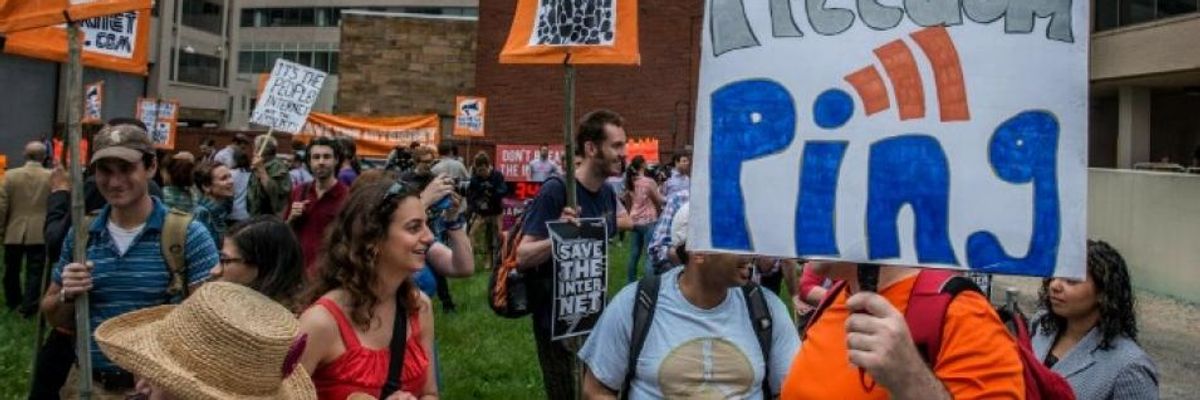Trump is attacking our communication rights on nearly every front. In its first 100 days, his administration has stripped away online privacy protections, expanded social media surveillance at the borders, gagged the press and threatened to destroy Net Neutrality.
It's easy to see all of these issues as separate fights, but each is part of Trump's sustained assault against democracy and democratic communications.
"The first 100 days are over, and the resistance forges ahead."
Democracy means different things to different people. At Free Press, we believe in a democracy where all voices are heard and valued. We've never really had that in this country.
Our government and media systems have historically worked to silence, ignore and erase people of color from political and cultural life. From 19th-century newspaper owners to burgeoning broadcast networks to today's massive conglomerates, corporate media gatekeepers have blocked diverse and dissenting voices from using their platforms. Racist news coverage spans decades and endures today. Companies that provide critical communications infrastructure such as telephone and internet services have cooperated with local police and federal agencies to spy on activists, from the Black Panthers to Black Lives Matter.
There have always been exceptions to these patterns. Our media history is full of bright spots, including dogged reporters and independent outlets that have challenged the powerful and faithfully represented disenfranchised communities.
But we're not talking about individual stories right now. We're talking about the broader systems in which those individuals have operated, a system that wealthy white men overwhelmingly control. Our media institutions have long engaged in an ever-evolving system that continually prevents marginalized voices from being heard.
For as long as there's been injustice, however, there have been activists fighting to uproot it and build real democracy. Activists have created movements for racial justice, gender justice, immigration justice, environmental justice and more. These movements are intimately connected with one another, because successful organizing depends on open lines of communication.
Activists know how essential communication is to our movements. That's why grassroots civil rights groups are fighting to close the digital divide, why Black Twitter users launched the hashtag #IfTheyGunnedMeDown to protest dehumanizing coverage of victims of police brutality. It's why the Movement for Black Lives includes demands for Net Neutrality and universal internet access in its platform. Movements centering the voices that mainstream media so often excludes have pushed us in the right direction, toward real democracy, though we have far to go.
Trump represents a vicious backlash to this hard-won progress and an opposition to democratic values. His campaign demonstrated absolute contempt for the voices these movements have lifted up -- and even stoked violence toward them. His administration has followed through on that bigoted and inflammatory rhetoric by targeting immigrants, Black people, women, Muslims and trans youth. All in the first 100 days.
Where does attacking our rights to freely connect and communicate fit into this? Trump's White supremacist agenda can't succeed in a world where the communities he threatens have access to truly democratic communications. That's why he's using all the tried-and-true tactics to roll back progress and systematically suppress justice movements and the coalitions of resistance they've formed.
"If we believe in real democracy--if we want to resist Trump--we must reject the notion that some people deserve less access to communications."
Trump's FCC is moving fast to unravel overwhelmingly popular Net Neutrality protections that allow anyone with internet access to speak freely online without worrying about Comcast or AT&T interfering. Another FCC vote teed up a fresh wave of media consolidation that would give Fox and Sinclair even more power. Chairman Ajit Pai has also directed the FCC to stop defending rules that made prison-phone calls more affordable, and to backpedal on the Lifeline Modernization Order, which updated the FCC's program to provide subsidies for low-income families struggling to afford broadband. Pai's actions have made it harder for poor people to afford the internet access they need to work, live and organize.
Throughout his campaign Trump berated the press for critical coverage, gaslighting reporters who sought to hold him accountable, attacking them as enemies of the American people and chipping away at press freedoms one violated norm at a time. In March he signed a bill that stripped internet users of critical privacy protections, and his administration continues to push for expansions to digital surveillance in its brutal targeting of immigrants and Muslims.
If we believe in real democracy -- if we want to resist Trump -- we must reject the notion that some people deserve less access to communications.
There's a common thread between these attacks: a deep-seated belief that some people deserve less than others. A belief that low-income families don't deserve as much access to broadband, that incarcerated individuals don't deserve to speak to their families, that people of color don't deserve to be treated as humans instead of criminals, and that activists don't deserve protection from surveillance.
Trump and the entrenched systems he represents tell us that for some people to stay safe, rich and powerful, others must be endangered, poor and weak. That for some of us to speak, others must be silenced.
That's not freedom. That's not democracy. That's not what we stand for.
The first 100 days are over, and the resistance forges ahead. To win, we need to defend our communication rights and the vision of real democracy our movements may one day build.

